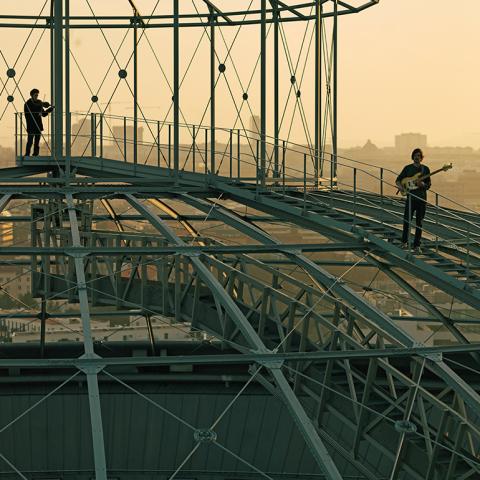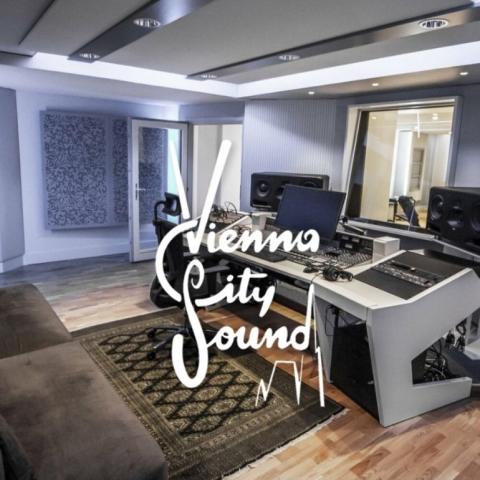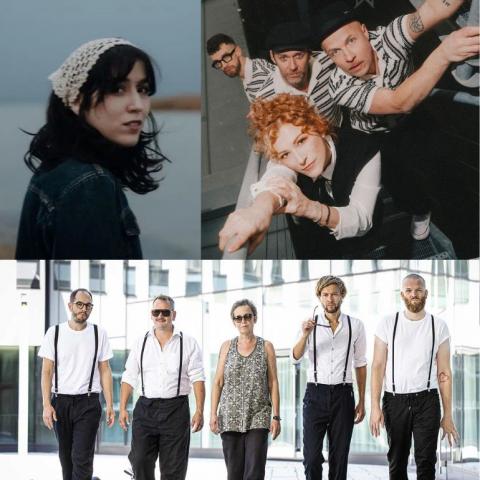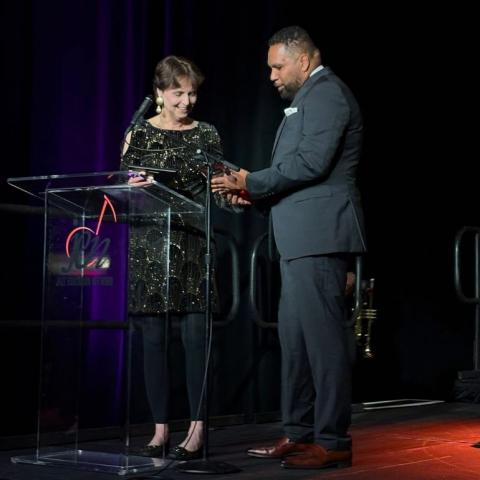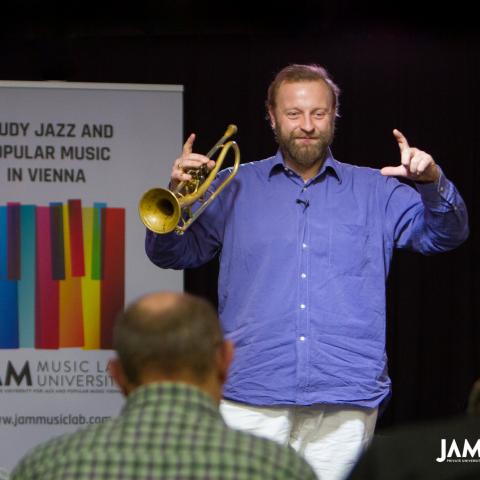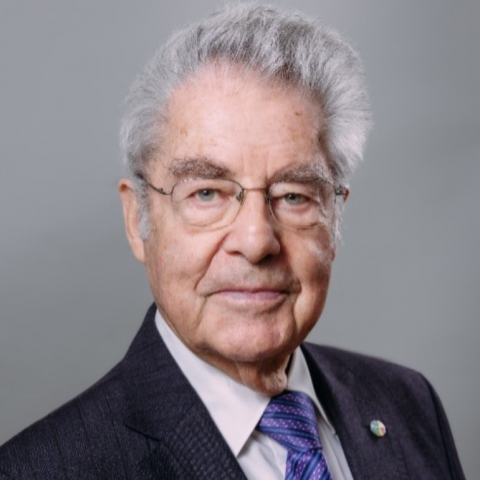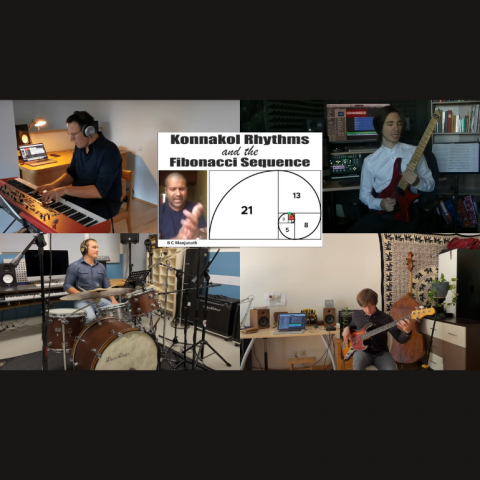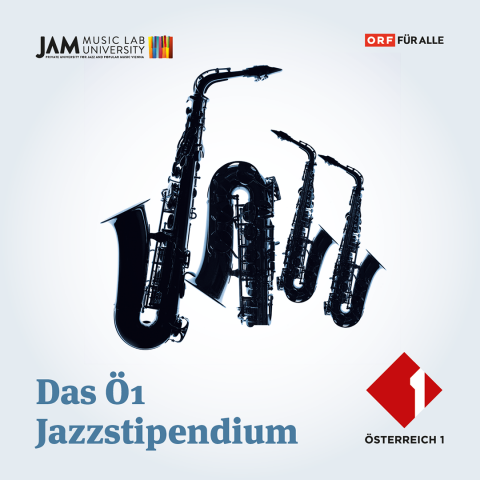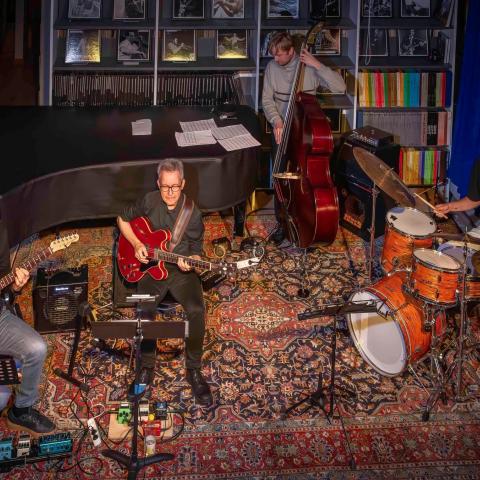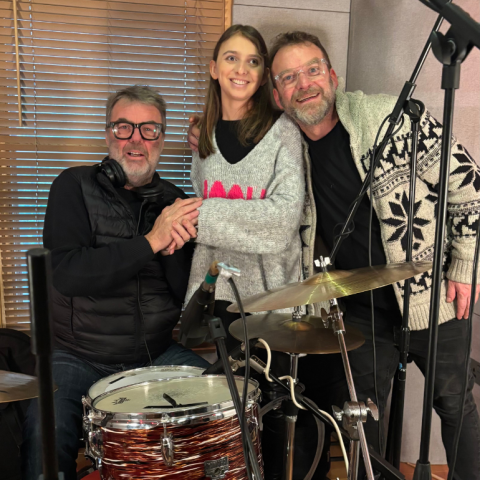Jazz historian Larry Appelbaum interviews Marcus Ratka
In May 2017, Larry Appelbaum, American jazz scholar, critic, broadcaster and Senior Music Specialist at the Library of Congress, and Marcus Ratka, Austrian musician, composer and Director of JAM MUSIC LAB University met in Washington D.C. and discussed the goals of the new music university in Vienna.
Larry Appelbaum: Let’s start with your concept of and vision for Jam Music Lab. How is this school different from other music schools, what’s the focus of your curriculum, how many current faculty and students are there and how do you hope to grow the program?
Marcus Ratka: JAM MUSIC LAB is the first music university in Austria solely dedicated to Jazz and Popular Music. The school was started in 2011 as a small conservatory in a cellar-location, to be honest it was not very posh. Now, we’ve not only relocated to one of the most attractive places on the creative scene in Vienna, we’ve also succeeded in being accredited as a university, offering both Bachelor and Master Degrees, and we’ll be developing PhD programs in the future. So a lot of things have changed but we remain faithful to the idea of being an institute that supports the student´s employability in various job markets. All of our teachers – and some of them became pretty successful in the course of their own careers – know how hard it is to survive as a musician. So we strive to educate, and an essential part of that is to prepare students for the challenges of a real musician’s life.
To that end, we instill in all our new students the importance of developing skills in the business of music that will help them meet future challenges not only as a player, but also as a composer, producer, engineer, educator, etc. To that end, our students are encouraged to find their own focus, enabling them to integrate working experiences into academic study. The university’s approach combines teaching, professional practice and research, and offers work experience opportunities which are systematically integrated into the curriculum. We’ve also established a powerful network of partners from private business, broadcast media, and cultural institutions, such as orchestras and theaters, as well as a broad variety of other schools.
At this point we’ve designed 4 categories of studies in Jazz and Popular Music:
- Bachelor of Arts in Music
- Bachelor of Arts in Music Education
- Master of Arts in Music
- Master of Arts in Music Education
In each of these studies, students can focus on typical majors, such as voice or any instrument common in jazz, pop and rock. Students may also choose to focus on composition or music theory, and we have a course of study we call Media Music: Film Scoring and Music Productions, which covers a wide range of production fields, including sound design, audio branding and music for computer games.
Finally, I would like to emphasis that in addition to all those things I just talked about – very practical oriented things – we are aware of the fact that we have to establish research activities as an university.
To that end, we´re focusing on what has become known as artistic research, and we’ve also created an emphasis on music pedagogy in relation to popular music, and music pedagogy as a tool of intercultural communication.
To give you some idea of our rate of growth, in 2011 we started with a team of 15 teachers and 70 Students. Now, in the fall of 2017, we´re expecting already 350 students, and the teacher´s staff includes about 60 instructors from various fields: musicians, composers, educators, scholars and producers. Our music campus in the Gasometer district allows further growth up to at least 1,000 students; but for now we’ll take it one step at a time. As John Cage said “There is no reason for anything other than optimism,” so we try to follow his advice!
Are you getting support from the city or the federal government?
In general: no. Our business plan is currently based on student´s fees and fund-raising. That way we stay independent even though it is, as you might guess, not always easy. Indirect support comes from the city of Vienna, which is trying to turn the Gasometer neighborhood into an arts district. It should also be noted that students may receive various forms of study support and scholarships and may participate in exchange programs, which is, of course, very attractive for a student’s life. But in general, we operate as a private business.
Talk about the audition process for your school. What level are entry level students at and what do they need to know before they can graduate?
Auditions at JAM include performance, music theory, and an interview. The difference with our auditions and those at other schools is that we´re not so much focused on finding out all the deficits a candidate might have, but rather we´re trying to find out strengths and skills. In the course of the interview, we want to learn something about the motivations and attitudes towards the idea of becoming a musician. If we are convinced by the musical performance and the interview, then any possible deficits in music theory, sight reading or academic ear training are not treated as disqualifying criteria. During the course of study, students will gain and strengthen those skills.
Graduates in Bachelor Degrees have to prove professional qualifications and competence for a wide range of activities in the field of Jazz and Popular music. As graduates, they will also have comprehensive experience with what is necessary to maintain a high standard of professional practice, particularly in the areas of communication, project planning, marketing and self- management.
Building on the abilities and qualifications acquired in the Bachelor studies, students of the Master's degree enter a process of intensified research and realization of musical and/or educational concepts. This includes their own individual artistic work. These aspects are brought into broad and interdisciplinary discourse of institute research through team and project work; e.g. Master’s project and Laboratories for Music Research.
Obviously, all your students can already play their instruments. Can you teach someone to swing or to improvise? How would you do that?
Well, I think learning to swing and improvise is something that can´t just be learned, it really has to become part of your life. And it´s not all about practicing, it´s also about listening. For example, if you´re spending years getting up in the morning, listening to Duke and Basie while drinking your coffee, you might know about swing already even if you´re not a musician. You still may not be able to explain swing to somebody else, but for yourself you’ve learned what it is. Also, in terms of improvising, young musicians who have a strong desire to express themselves as improvisers commonly find a very natural approach by imitating the things they like to listen to, and then just by assimilation they can form their vocabulary. In my point of view, they should be very carefully instructed when they come into a formal music education at this stage. The “professional methods” of teaching jazz, and especially teaching improvisation, became very effective – sometimes too effective, I would say. The jazz scene is full of academically trained virtuosos, playing on an incredibly high technical level; but there may not be many people who want to listen to them. The reason might be that the methods mentioned above lead to very similar results, musical results which are not very authentic, which are lacking an individual impulse, and that becomes, if you want to sum it up – boring. Technique is a tool that we can teach, but we also strongly encourage students to develop their own voices, to tell their own stories.
What do you think makes a good teacher? What qualities do you look for when hiring faculty?
I think everything depends so much on the context. When I look back to my own experiences for example: I was studying jazz theory and arrangement with Heinz Czadek. In general I was always told I had some talent, and I was always a bit in danger of getting lazy. But Heinz seemed not to be too impressed by my talent, he wouldn´t accept any excuses and kicked my butt until I got all my homework done and became more serious about my studies. For my development, this was the perfect educational approach. I learned the most important things during this time, and many of those things are still basic fundamentals I can rely on in my work as a composer and arranger. So I think it´s important that a good teacher is able to find individual approaches for specific students and be able to pick them up, where they are at the moment and help them improve and find their own voice.
Do you have studios for recording or for teaching production skills?
Yes, we have various work stations with all kind of different set ups for recording and producing music. And we have a concert room which is also set up as a recording studio in which we´re doing a lot of music production and live recordings. We’ve also set up a collaboration between some studios in Vienna and JAM MUSIC LAB to be able to offer different focuses of recording situations to our students.
Where are students coming from, both literally and aesthetically? Are all your students from Austria or are you reaching out to the rest of Europe and beyond?
Talking in terms of music, our students have strong backgrounds in jazz, blues, pop, rock, various folk music, as well as music from Europe, South America, Africa and Asia. Our students work in both acoustic and electronic music contexts, and all sorts of cross-over music and various hybrid music styles. Some students also have strong backgrounds in classical music. Most of them are 20-25 years old, so they are socialized with all sorts of music starting from the 1990s. Approximately 75% of our students come from Austria and the European Union. Amongst others we have further students from Ukraine and Russia, China, Taiwan, Japan, South Korea, Brasil, Venezuela and Colombia.
What is your own background as a player and educator?
I´m natural born Viennese! Growing up only a stone´s throw away from Franz Schubert´s birthplace, I was naturally suffused by the spirit of Viennese music. Those influences remain important even today. When I was a 10-12-year-old boy, I started to pick up the guitar and played whatever I heard, mostly Blues and Blues-related music. Finally, I studied music composition and music theory, guitar and musicology. In the early 1990s, I began to work as a musician, arranger and composer for local bands, broadcast orchestras and theatres. Bit by bit I had the chance to come into contact and cooperation with great musicians and artists such as Joe Zawinul, Thomas Gansch and Jérôme Savary. In addition to composing, playing the guitar and putting bands together, teaching music has always been an essential part of my life. From the mid- 1990s, I was working at various conservatories in Vienna, mainly as a lecturer for jazz guitar and music theory, and also as an ensemble director. Between 2008 and 2011, I was leading the classes for composition, arranging and music theory in the jazz department at the Musikhochschule Franz Liszt in Weimar, Germany. And in 2011, I became the co-founder of JAM MUSIC LAB.
In addition to running the school, you’re about to launch a composition competition to mark the 100th birthday of Thelonious Monk. Why Monk? What does he represent to you and your students? What is the submission process for the competition and what kind of works are you hoping to solicit? And what is the reward for the winning competition or arrangement?
Well to me personally – especially as a composer – Monk has a very important meaning and influence, comparable to Ellington and Mingus. Monk’s music has opened doors to new avenues of sounds, structures and ways of creating music. When I listened to him the first time as a young musician, he made me aware of the beauty of dissonance and the various delicious contradictions in the arts. I was, and am, fascinated by the way he was able to expand the vocabulary of Jazz through innovation and originality, and enrich the musical language for improvisers.
I am also proud to say that Thelonious Monk and I share a birthday, October 10th! So I feel that for all those reasons it is appropriate for us to do something special to celebrate his 100th birthday. And to properly celebrate a great composer, we launched a composition competition, called “Spheres of a Genius”. We have arranged a very special place for presenting the winning piece: The Concert Hall of the prestigious Wiener Musikverein“ – one of the epicenters of classical music. Built in 1870, Brahms, Mahler, Schoenberg and many others premiered their works at the Musikverein, and for half a century the Viennese Philharmonic Orchestra celebrates the famous New Year’s concert there, which is seen by approximately a billion viewers worldwide every year.
I have to offer our sincere thanks to Christoph Becher, the general manager of the ORF Radio-Symphony Orchestra Vienna, to believe in this idea. He has made it possible that the winning composition will be premiered by the RSO and Jazz soloists on June 7th, 2018 and be broadcast as part of the Ö1 radio programme. Also I´m very grateful to the Berndorf Private Foundation and its directors Peter Pichler and Norbert Zimmermann for their support in making further prices possible: In addition to the concert, the winner receives € 5.000. Second prize is € 3.000, third prize takes € 2.000.
The aim of the contest is to create music that will reflect the spirit of Thelonious Monk; to provoke inspiration for further innovation, originality and musical communication in contemporary jazz. The competition is international and without age limitation. All persons who have submitted full application documents in due time are entitled to participate. The competition will be carried out in two evaluation runs:
Phase 1 consists of the submission of a meaningful sketch of the entire work as well as a fully elaborated segment of
the score with a duration of 1.5 to 2 minutes
The deadline for submission of Phase 1 is JUNE 1st, 2017, so everybody who might be interested, don´t hesitate!
How will you measure the success of your school and the competition?
I would consider it to be a great success if we, while growing as an institution, keep on fulfilling this function of supporting young artists from all over the world to find their individual talents and own ways of creating music while helping them to become more efficient in building and promoting their careers. Talking in terms of university science and research, success will be defined by building further cooperation with prestigious institutions worldwide. During the next five years, our aim is to put two PhD programs into practice, focusing on “Applied Artistic Research“ and “Music Pedagogy in fields of Jazz and Popular Music.“
The “Spheres of a Genius" competition is meant to help foster and create new music that will reflect the spirit of Thelonious Monk from a contemporary perspective. We will consider it to be a success if we can encourage contemporary writers in jazz and beyond who are inspired by Monk to create compelling and challenging pieces of modern music.
